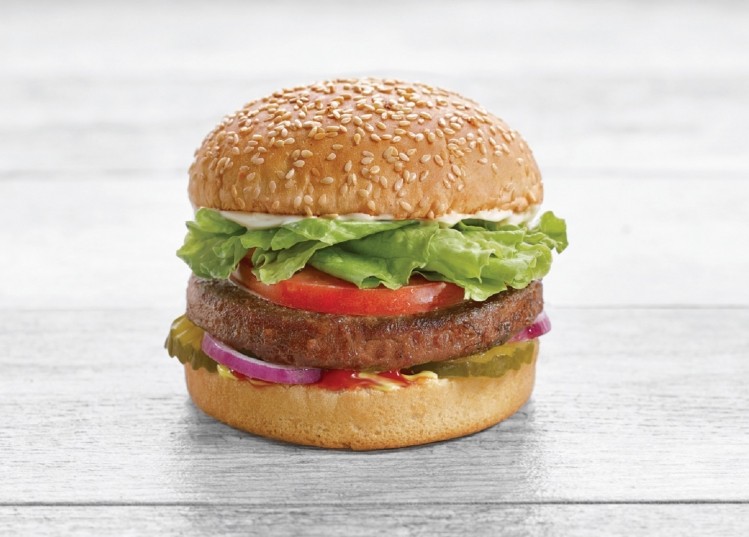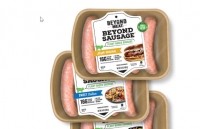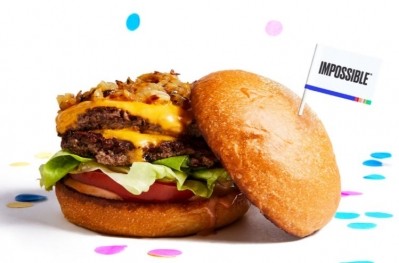The plant-based Beyond Burger is now in 10,000+ foodservice outlets

The move reflects the brand’s growing interest in the foodservice market, but also its desire to build an international presence, coming hot on the heels of an announcement in May highlighting plans to “enter over 50 countries including Germany and the rest of Europe, Canada, Australia, Mexico, Chile, Israel, UAE, Korea, Taiwan and South Africa.”
The pea-protein-based Beyond Burger – which Beyond Meat claims “looks, cooks and satisfies like beef” – is now on the menu at a wide variety of QSR chains, from TGI Fridays to Veggie Grill, and 9,000+ grocery stores from Whole Foods to Kroger, which merchandise it alongside regular beef burgers at the meat counter.
Co-founded by Ethan Brown and Brent Taylor in 2009, Beyond Meat launched its first products on the national stage in 2013, and notched up triple-digit growth in 2017, according to executive chairman Seth Goldman, who said the majority of Beyond Burger fans were flexitarians - meat eaters cutting down on meat, rather than hardcore vegans/vegetarians – validating the initially controversial decision to merchandise the product in the meat case.

Beyond Meat products include pea-protein-based Beast burgers and sliders; chicken-style strips (made from non-GMO soy and pea protein); crumbles (made with pea protein); and its highest profile product, the pea protein-based Beyond Burger, which is sold chilled alongside conventional meat.
Ingredients list, Beyond Burger: Water, pea protein isolate, expeller-pressed canola oil, refined coconut oil, contains 2% or less of the following: cellulose from bamboo, methylcellulose, potato starch, natural flavor, maltodextrin, yeast extract, salt, sunflower oil, vegetable glycerin, dried yeast, gum arabic, citrus extract (to protect quality), ascorbic acid (to maintain color), beet juice extract (for color), acetic acid, succinic acid, modified food starch, annatto (for color).
Selling plant-based burgers in the foodservice market
Speaking at the Plant Based Food Innovation Summit at Mattson’s new HQ in Foster City, CA in February, Colleen McClellan, director, client solutions, at foodservice market researcher Datassential, said some foodservice operators are actively using the terms ‘plant-based’ or ‘plant-forward’ on menus.
Others prefer not to dwell on a dish’s animal-free credentials but focus instead on calling out specific ingredients (maitake, chia, fava bean, spirulina), buzzwords (‘super food bowl,’ ‘super salad’) or cuisine types (Ethiopian, Indian) where the dish in question just happens to be vegan or vegetarian, she said.

“Vegan foods aren’t just for vegans anymore, but plant-based must be crave-worthy,” added McClellan, showing an uninspiring picture of a generic garden-type-burger on a restaurant menu and comparing it with pictures of the Beyond Burger and the Impossible Burger, plus Sonic’s blended burger (made with a blend of beef and mushrooms): thick, juicy, meaty-looking burgers sitting next to their 100% meat-based counterparts.
And while consumer survey data by Datassential and Mattson suggests that consumers believe plant-based is healthier, savvy restaurant operators featuring the latest generation of meat-free burgers (which are targeting meat eaters and vegans/vegetarians alike) are not shouting about health – or saving the planet - on menus, she said.
“It’s about deliciousness. The words vegan and vegetarian are the kiss of death for some consumers."
On the face of it, the terms ‘vegan’ and ‘plant-based’ might appear to be interchangeable (they both involve avoiding animal products), but consumers do not view them in the same way, reveals new research from food development specialist Mattson.
“Late last year, we commissioned a third-party company to conduct a survey on who is ordering the Impossible Burger. The overwhelming majority of people who buy the burger (about 70%) are regular meat eaters." Read more HERE.
David Lee, chief financial officer, Impossible Foods






















